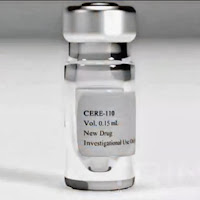
Huntington’s Dementia Problem Fixed in Mice
Researchers discovered how genetic mutations in Huntington’s disease kill brain cells. Learn why this discovery may be relevant to other types of dementia, as well.

Researchers discovered how genetic mutations in Huntington’s disease kill brain cells. Learn why this discovery may be relevant to other types of dementia, as well.

The 2014 update to the National Plan to Address Alzheimer’s Disease was unveiled at the Advisory Council on Alzheimer’s Research, Care, and Services in Washington, DC. Check

VIDEO + ARTICLE CERE-110 is a big step forward for Alzheimer’s clinical trials. It induces brain cells to make their own nerve-growth-factor, so they can

VIDEO + TRANSCRIPT: 3 experimental drugs are part of a fascinating genetic study on how to prevent Alzheimer’s. NBC’s chief science correspondent Robert Bazell investigates.

International researchers pinpointed a rare coding variation in the Phospholipase D3 (PLD3) gene which is more common in people with late-onset Alzheimer’s than non-sufferers. Find

VIDEO & IN-DEPTH ARTICLE The world’s 4 largest international Alzheimer’s genetic consortiums have joined forces. The goal? To win the war on Alzheimer’s. Since joining

When Memory Loss Becomes Invisible to Those Who Need Help Most

Ketone-rich diets increase the SIRT3 protein that protects neurons from death during the progression of Alzheimer’s disease. But how does it work? Find out more.

A safer Alzheimer’s treatment may be on the horizon — but families still have meaningful choices today.

Swiss researchers find that people with certain personality traits are protected against Alzheimer’s disease, including those who are less agreeable, had natural curiosity, and were nonconformists. Find out why.

Learn about ‘personalized music for dementia’ and its powerful effect on Alzheimer’s. See the Director of the hit film, ‘Alive Inside’, on the dementia-impact of music.

The brush strokes are precise, the colors vibrant. See a Colorado art program help patients rise above dementia, while the paintings raise money for The Alzheimer’s Association.

The protein BDNF builds synapses in the human brain, nurturing brain cells and fighting off dementia. While there is no artificial way of boosting it, social and cognitive activity can.
No spam, only news and updates.


